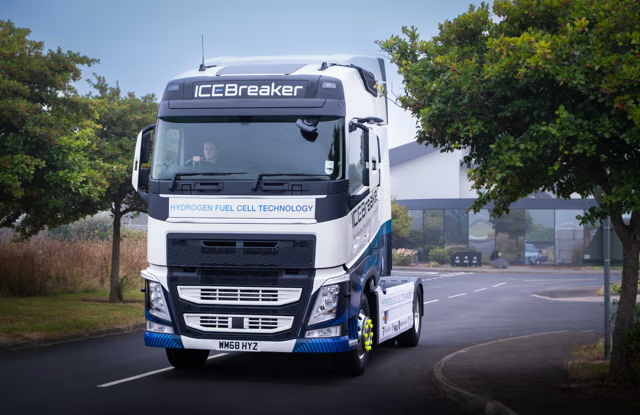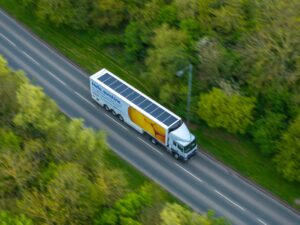Project ICEBreaker, delivered by a consortium of leading British engineering companies, has unveiled a fully configured hydrogen fuel cell HGV truck. It answers many of the key design and development questions faced by the automotive industry as it prepares the next generation of light and heavy-duty commercial vehicles to meet new zero-emissions regulations from the EU that start to take effect in 2030.
The project has brought together the hydrogen engineering expertise of Viritech, HORIBA MIRA and Intelligent Energy, with funding from the Department for Business and Trade (DBT) through the Advanced Propulsion Centre UK’s Advanced Route to Market Demonstrator competition. Jointly, they have developed a drivetrain solution that answers the critical hydrogen engineering challenges in the creation of a fuel-cell electric vehicle truck with the fuel cells as the prime mover, supported by a small 16 kWh battery with 400kW charge/discharge capacity and fuel-cell optimised DC-DC converters. A pair of Intelligent Energy DRIVE HD100 fuel cells operating in parallel deliver 200kW of primary motive power.
Importantly, ICEBreaker’s drivetrain architecture provides a pathway for all categories of goods vehicles, from light vans to HGVs, to transition to zero emissions with solutions that retrofit or integrate with existing vehicle form factors while also answering key operator requirements such as maintaining payload.
Addressing hydrogen challenges head-on
Intelligent Energy’s DRIVE HD100 fuel cells (with 30% smaller heat exchangers achieved by patented direct water injection technology) have provided ICEBreaker with the potential to integrate the entire hydrogen drivetrain within existing HGV form factors, thereby enabling OEMs to avoid significant design costs associated with transitioning to a new fuel vector.
In turn, Viritech’s proprietary DC-DC converter has been specially developed to contend with fuel cells’ high current and low voltage requirements. It combines with a small but higher power density battery pack, reclaiming valuable load space. With a 75% smaller battery pack than an equivalent FCEV HGV, payload is increased, and mass, cost and mineral use are significantly reduced. Coupled with Viritech’s high-sampling rate proprietary BMS, the battery fill-in cycles operating with the prime mover fuel cells result in a highly optimised and efficient system.
ICEBreaker’s driveline is one of the first to be designed and installed as a high-pressure 700-bar system. Consequently, it has a comprehensive hydrogen management component intended to operate at this pressure. In doing so, ICEBreaker delivers superior energy density and increased range.
Integrated, controlled and cooled
The partners have collaborated to harness the novel technologies Intelligent Energy and Viritech developed to deliver an integrated solution. HORIBA MIRA focused on the vehicle control system, the CAE-simulated and verified thermal management of key components, including the battery pack, DC-DC converters, motor and ancillaries, and the high and low-voltage wiring systems. In addition, ICEBreaker has been designed and realised with a digital twin at the heart of its engineering approach.
Data-driven from drawing board to destination
ICEBreaker’s digital twin has delivered two key dividends. With commercial considerations at the heart of goods vehicle operations, HORIBA MIRA has built exacting total cost of ownership forecasts for ICEBreaker in parallel with the prototype design and build, so the engineering is tailored to operators’ commercial considerations. The digital twin also sits at the heart of a complete lifecycle approach to managing vehicle operations by continuously drawing data from the drivetrain and returning optimised updates to account for changes in component performance, such as battery degradation, over the vehicle’s complete lifetime.
This data-driven calibration optimisation from HORIBA MIRA forms the backbone of a suite of intelligent on- and off-board systems that provide a comprehensive way for fleet operators to minimise the total cost of operations and keep fleets commercially viable over the entire asset lifetime.
The safety case
The complete ICEBreaker vehicle design and build in a truncated 12-month period has enabled the project partners to develop a comprehensive safety engineering approach for hydrogen fuel cell vehicle design and proof-of-concept build. This has spanned all aspects of the project, from technician training to specific hardware designs from hydrogen storage vessel relief valves to tank control units, all of which provide another invaluable link in the hydrogen engineering toolchain.
Comprehensively clean
The ICEBreaker project, embodied in the debut of the HGV launched at the Cenex Expo, provides a complete hydrogen engineering approach from design to build, test, verify, and operate FCEV goods vehicles for OEMs and their tiered supply chain. In addition, ICEBreaker not only provides the technical pathway to meet emissions compliance with FCEV commercial vehicles but has also developed toolsets that respond to the commercial lifetime operations of next-generation clean vehicles for end customers.
Timothy Lyons, Viritech’s CEO, said: ‘ICEBreaker has been an intense but purposeful project for Viritech, HORIBA MIRA and Intelligent Energy. In less than 12 months, our combined experience has enabled us to jointly develop an engineering process to design, plan and integrate the operation of a hydrogen drivetrain for commercial vehicles. This process has developed new hydrogen-specific hardware, control systems and software to enhance vehicle deployment, demanded a safety engineering approach for a new fuel vector and demonstrated its full integration into an existing HGV architecture. We’re confident that this project will deliver important insights that will be of great use to the industry as it embraces hydrogen to tackle forthcoming emissions regulations.’




